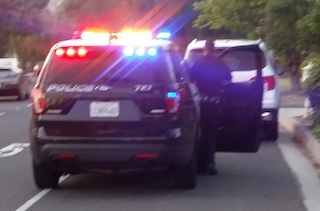If the driver was under age 21 and refused to submit to a preliminary alcohol screening (PAS) test at the arrest location or did submit, but his or her breath measured 0.01% or higher, the DMV will suspend or revoke the driver’s privileges under Vehicle Code § 23616 thirty days after the arrest.
The driver, however, can “stay” or stop the suspension by reserving an Admin Per Se (APS) hearing with the DMV within ten days of the arrest. Otherwise, the Temporary License will expire in 30 days and the DMV will suspend the license for 4 months. If the driver reserves an APS hearing, the driver can then drive on the Temporary License with no restrictions until a ruling after the APS hearing.
At the APS hearing, if the DMV determines that the under-21 driver refused the PAS test or had a BAC of 0.01% or higher, the DMV will suspend the license for one year for a first offense. If the arrest for DUI is the under-21 driver’s second such arrest (and the driver’s license was previously suspended once), the DMV will revoke the driving privileges for two years. If the arrest for DUI is the under-21 driver’s third such arrest (and the license was suspended and revoked previously for this), then the DMV will revoke the driving privileges for three years.
If the DMV determines the under-21 driver did not refuse the PAS test or did not have a BAC of 0.01% or higher, the suspension will be set aside and the driver’s driving privileges will be reinstated.
If the driver is 21 years old or older, it is the driver’s first such arrest in the last ten years and there was no injury or death, the DMV will suspend the driving privileges for four months if the person refused to submit to a breath or blood test or the person did submit to either test, but the driver’s blood alcohol content (BAC) was measured at 0.08% or higher by weight, or 0.04% by weight if the driver was driving a commercial vehicle.
The 21 or older driver, however, can “stay” or stop the suspension by reserving an APS hearing with the DMV within ten days of the arrest. Otherwise, the Temporary License will expire in 30 days and the DMV will suspend the license for 4 months. If the driver reserves an APS hearing, the driver can then drive on the Temporary License with no restrictions until a ruling after the APS hearing.
At the APS Hearing, if the DMV determines the driver refused a breath or blood test, the DMV will then suspend the license for one year for a first-time offender. During that one year, the driver is ineligible for a restricted license.
If, at the APS Hearing, the DMV determines that the driver has a BAC of 0.08% or higher by weight, or 0.04% or higher while driving a commercial vehicle, the DMV will suspend the license for four months. The driver may then apply immediately for a restricted license with the installation of an Ignition Interlock Device (IID). The driver can then drive anywhere with the IID installed. This restriction lasts for four months.
Alternatively, the driver can apply for a restricted license without an IID installed, but must first wait 30 days after the suspension becomes effective. The IID-less restricted license is for five months and the driver can only drive to and from work and an alcohol treatment program.
The fee for both such types of restricted licenses is $125 and the driver must show the DMV proof of insurance (usually through an SR-22 form) and proof of enrollment in a DUI treatment program.
If the DUI arrest is the driver’s second or more arrest for DUI within ten years, the DMV will suspend the driver’s license for one year, effective 30 days after the arrest (when the Temporary License expires). Imposition of the suspension can be stayed or stopped by reserving an APS hearing with the DMV within ten days of the arrest.
The driver can then apply for a restricted license from the DMV immediately with installation of an IID. The restricted license lasts for a year, during which time the IID must remain installed in the car throughout, which can be quite expensive.
The driver can also apply for an IID-less restricted license if the arrest was the driver’s first within ten years, but the driver cannot do so until 30 days of the suspension is first served. The restricted license with no IID then lasts for five months and the driver may only drive to and from work and his or her alcohol treatment program.
The fee for both such types of restricted licenses is $125 and the driver must show the DMV proof of insurance (usually through an SR-22 form) and proof of enrollment in a DUI treatment program.
Both types of restricted licenses are available even if there was an injury or death arising from the DUI, but keep in mind, especially on these types of cases, that the DMV may also bring a negligent driver administrative hearing against the driver and the driver usually faces a simultaneous court proceeding.
For more information about DMV issues, please click on the following articles:
 Traffic Stop
Traffic Stop